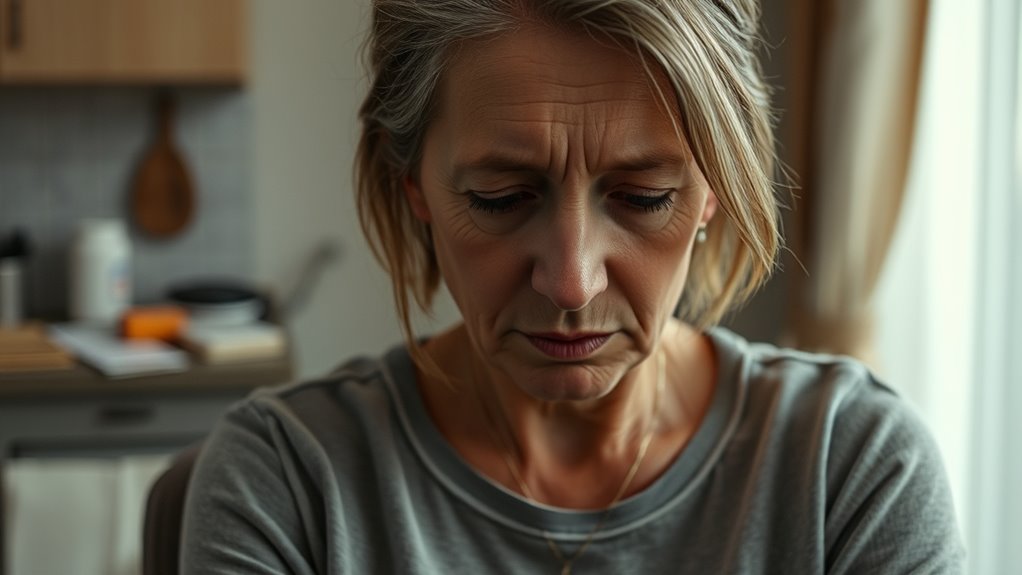If you’re caring for someone and notice feelings of emotional exhaustion, social withdrawal, or losing interest in activities you once enjoyed, these could be signs of depression. You might feel drained, overwhelmed, or isolated, even if you’re getting enough sleep. Recognizing these symptoms early is vital to prevent your mental health from declining further. Staying aware of these signs helps you take steps to protect your well-being—more information can guide you through understanding and managing these feelings.
Key Takeaways
- Emotional exhaustion manifests as feeling drained, overwhelmed, and losing interest in activities previously enjoyed.
- Social withdrawal involves avoiding social interactions, leading to increased loneliness and feelings of hopelessness.
- Caregivers may experience a cycle where exhaustion and withdrawal reinforce each other, worsening mental health.
- Signs include persistent fatigue, decreased motivation, and withdrawal from support systems or social engagements.
- Early recognition and seeking help can prevent escalation to severe depression and support caregiver well-being.

Caring for someone else can take a serious toll on your mental health, and recognizing the signs of depression is essential. When you’re constantly attending to another person’s needs, it’s easy to overlook how it affects your emotional state. One of the most common signs is emotional exhaustion. You might feel drained, overwhelmed, or numb, even after a full night’s sleep. This exhaustion isn’t just fatigue; it’s a deep sense of emotional depletion that leaves you feeling like you have nothing left to give. It can make everyday tasks feel monumental, and you may find yourself losing interest in activities that once brought you joy. Recognizing emotional exhaustion early is crucial because it often serves as an early warning sign of depression, especially in caregivers who are used to prioritizing others over themselves. Additionally, incorporating meditation practices can help manage stress and improve emotional resilience over time.
Another key indicator is social withdrawal. You might notice yourself pulling away from friends and family, avoiding social gatherings, or skipping out on activities you used to enjoy. Caregivers often feel guilty or ashamed for taking time for themselves, so they isolate instead. This withdrawal isn’t just about needing a break; it’s a sign that your mental health might be suffering. Social interactions can feel exhausting and overwhelming, leading you to retreat further into solitude. Over time, this pattern can deepen feelings of loneliness and despair, which are hallmarks of depression. Recognizing when you’re withdrawing from others, especially if it’s accompanied by feelings of sadness or hopelessness, is vital to catching depression early.
These signs—emotional exhaustion and social withdrawal—often occur together, creating a cycle that worsens your mental health. As you become more exhausted emotionally, you might withdraw further, feeling like you can’t handle social interactions anymore. This cycle can be difficult to break without support, but awareness is the first step. If you notice yourself feeling more emotionally drained than usual or avoiding loved ones and social activities, it’s time to pay closer attention to your mental health. Ignoring these signs can lead to more severe depression, making it harder to care for your loved one and yourself. Remember, seeking help isn’t a sign of weakness; it’s a necessary step towards maintaining your well-being. Recognizing these warning signs allows you to take action before depression takes a stronger hold, ensuring you get the support you need to navigate this challenging time.
Frequently Asked Questions
How Can Caregivers Seek Immediate Help for Depression Symptoms?
If you experience depression symptoms, seek immediate help by calling emergency resources like 911 or a mental health crisis hotline. Reach out to your support networks, including friends, family, or support groups, for urgent assistance. Don’t hesitate to ask for professional help from a therapist or counselor. Remember, getting prompt help can make a significant difference, so act quickly and utilize available emergency services and support systems.
Are There Specific Risk Factors That Make Caregivers More Prone to Depression?
Like a fragile glass, your emotional resilience can shatter under certain risk factors, increasing your chances of depression. If you experience caregiver burnout or emotional exhaustion regularly, you’re more vulnerable. Other factors include limited social support, financial stress, or pre-existing mental health issues. Recognizing these risk factors helps you stay alert, allowing you to seek help early and prevent depression from taking hold.
What Are Effective Coping Strategies for Caregiver Depression?
To cope with caregiver depression, prioritize self-care routines like regular exercise, balanced eating, and sufficient sleep. Don’t hesitate to seek support; developing a support network with friends, family, or support groups can provide emotional relief. Remember, taking time for yourself isn’t selfish—it’s essential. By actively implementing these strategies, you can better manage stress and maintain your well-being while caring for others.
Can Depression in Caregivers Affect the Care Recipient’s Health?
Yes, caregiver depression can impact the care recipient’s health. When you experience caregiver burnout and emotional exhaustion, your ability to provide attentive, compassionate care diminishes. This may lead to missed symptoms, poor medication management, or emotional neglect, which can negatively affect the recipient’s well-being. Addressing your mental health through support and self-care helps guarantee you can maintain a high standard of care and safeguard your loved one’s health.
When Should Caregivers Consider Professional Mental Health Support?
If you notice persistent feelings of sadness, exhaustion, or hopelessness, it’s time to seek professional mental health support. About 40% of caregivers experience depression, so emotional awareness is key. Don’t hesitate to reach out if support networks aren’t enough or if your well-being declines. Prioritize your mental health—professional help can provide strategies to cope and guarantee you can continue caring effectively.
Conclusion
Remember, caring for others shouldn’t mean neglecting yourself. If you notice signs of depression, don’t ignore them—address them early. Reach out for support and prioritize your well-being. After all, you can’t pour from an empty cup; taking care of yourself helps you better care for others. As the saying goes, “You can’t shine your light if your own flame’s flickering.” Keep your flame burning bright, and seek help when needed.









